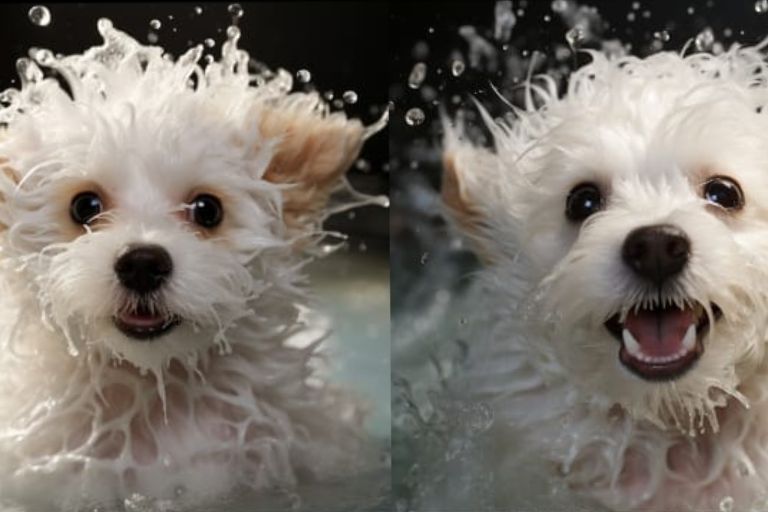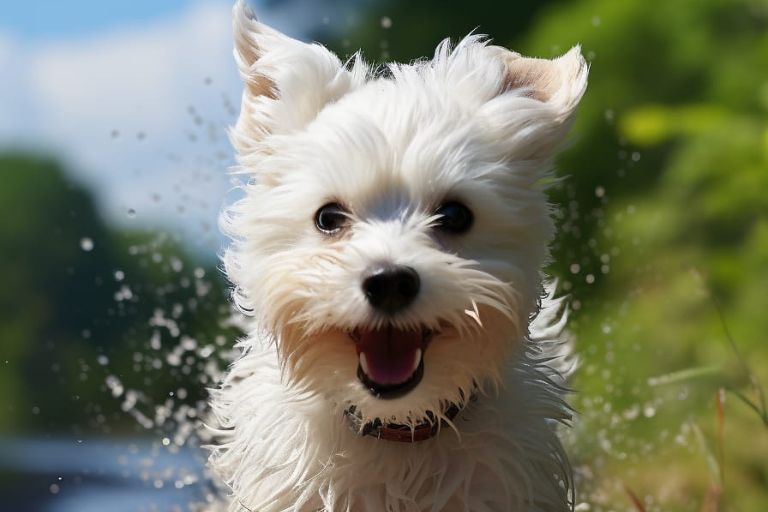Bichon Frise fur is its distinguishing feature which is also considered its emblem. In order to maintain this white coat in its original form it is very crucial to clean it from time to time and ensure proper grooming. Moreover, Bichon Frise are also prone to tear stains due to eye boggers. These can make your Bichon look lazy. But despite all these factors it is very important to understand that how often to wash Bichon Frise.
Table of Contents
If you understand the answer of how often should you bathe a Bichon Frise puppy, it will become very easy for you to apply other necessary grooming tips. For new owners in simplest explanation you should bath Bichon Frise every 3 to 4 weeks on average. Now let us delve into the detail of this question so you can understand the concept in the best possible way.
How Often To Wash Bichon Frise?
The Basics of Bichon Grooming
Before getting into the details about how often to bathe Bichon, it is very important to understand the broader context of their grooming needs. In addition to bathing, regular brushing, ear cleaning, nail trimming, and dental care are all important components of maintaining a happy and healthy Bichon.
Understanding Bichon Frise Coat Type
Before diving into a bathing schedule, it’s important to understand the unique coat characteristics of a Bichon Frise. Their double coat consists of a dense, soft undercoat and a coarser outer coat. These coats are known for being non-shedding, which means they require regular maintenance to prevent matting and tangling.
Factors Influencing Bathing Frequency
Now that you know that how often to wash bichon Frise, let us learn more about other significant factors.
- Activity Level: Bichons that are more active and spend time outdoors may require more frequent baths compared to those with a more sedentary lifestyle.
- Coat Type: Bichon Frises have a double coat that consists of a soft, dense undercoat and a curly, coarse outer coat. While their fur is naturally resistant to dirt and debris, the frequency of baths may be influenced by the type and condition of their coat.
- Skin Sensitivity: Some Bichon Frises may have more sensitive skin and may require less frequent bathing to avoid irritation.
- Allergies or Skin Conditions: If your Bichon Frise has allergies or skin conditions, consult with your vet for specific bathing recommendations
- Lifestyle: Indoor dogs generally require less frequent baths compared to those who spend more time outdoors.
- Age: Puppies generally require more frequent baths as they tend to get dirty more quickly while exploring their surroundings

Basic Bathing Guidelines Frequency
In general, Bichon Frise should be bathed every 3 to 4 weeks. This interval strikes a balance between keeping their coat clean and preventing over washing, which can strip their coat of essential oils.
- Preparation: Gather all necessary supplies before beginning the bath. You’ll need dog shampoo, conditioner (if desired), towels, a brush, a non-slip surface, and a blow dryer.
- Brushing: Before bathing, thoroughly brush your Bichon to remove any tangles or mats. This will make the bathing process smoother and more comfortable for your dog.
- Water Temperature: Use lukewarm water. Too hot or too cold water can be uncomfortable for your dog.
- Shampoo Selection: Choose a high-quality dog shampoo formulated for Bichon Frises.
- Thorough Rinse: Ensure all soap is thoroughly rinsed from your Bichon’s coat. Residual soap can lead to skin irritation.
- Avoid Eye and Ear Contact: You should also avoid contact of any product with eyes and ear. This avoids stinging, irritation and any possible eye infection.
- Conditioner (Optional): If your Bichon’s coat tends to tangle easily, consider using a dog conditioner to keep it soft and manageable.
Post-Bath Care
After the bath, it’s important to take some additional steps to ensure your Bichon is comfortable:
- Drying: Use a towel to gently blot excess water from your dog’s coat. Be careful not to rub vigorously, as this can lead to tangles.
- Brushing: Once your Bichon is mostly dry, use a brush to gently detangle the coat. This helps prevent mats and keeps the coat looking its best.
- Blow Drying: Use a low-heat setting on a blow dryer to finish drying your Bichon. Keep the dryer moving to prevent overheating.

Conclusion
Bichon Frises are beloved companions known for their fluffy white coats and cheerful personalities. Proper grooming is essential to keep your Bichon healthy and happy. One crucial aspect of grooming is bathing, but how often to wash Bichon Frise at home? Bichon Frise white coat is its most popular representation.
Therefore it is very important to maintain this white coat and groom it properly to avoid any problems which can destroy its appearance which give it its cuteness. You can use all the above mentioned guidelines for preparing the bath and for making it interesting for you Bichon Frise. You can also use the post bathe techniques to make the coat appear more bright.
FAQs
What should I do between baths to keep my Bichon clean?
Between baths, you can use a damp cloth to wipe down your Bichon’s coat and paws to remove any surface dirt or debris. Regular brushing will also help keep their coat clean and free of tangles.
How do I choose the right shampoo for my Bichon Frise?
Opt for a gentle, dog-specific shampoo that is formulated for sensitive skin. Avoid harsh chemicals or fragrances that may irritate your Bichon’s skin.
How to wash Bichon Frise, when he hates water?
Start by making bath time a positive experience with treats, gentle praise, and a calm environment. Gradually introduce them to the water, and be patient
Can I bathe my Bichon Frise at home or should I go to a professional groomer?
Bathing your Bichon at home is perfectly fine, provided you have the right supplies and a suitable space. However, some owners prefer to visit a professional groomer, especially for more complex grooming tasks like haircuts
Can I bathe my Bichon Frise often?
While regular baths are essential for maintaining your Bichon’s hygiene, it’s possible to overdo it. Bathing too frequently can strip the coat of natural oils, leading to dryness and skin issues. Stick to the recommended interval of every 3 to 4 weeks.

